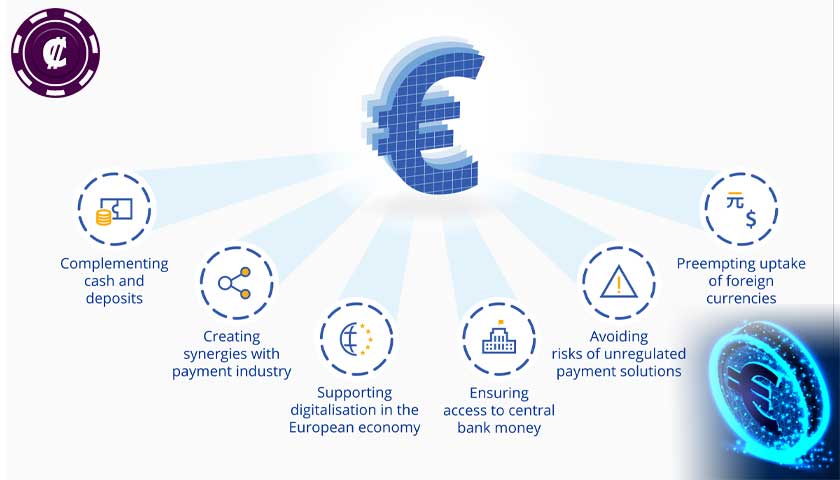Eurosystem launches digital euro project
? Investigation phase of digital euro project to last 24 months
? Design to be based on users’ preferences and technical advice by merchants and intermediaries
? No technical obstacles identified during preliminary experimentation phase
The Governing Council of the European Central Bank (ECB) has decided today to launch the investigation phase of a digital euro project. Following the decision, the President of the Eurogroup Paschal Donohoe joined the meeting, congratulated the Governing Council and expressed his full support for the project.
“It has been nine months since we published our report on a digital euro. In that time, we have carried out further analysis, sought input from citizens and professionals, and conducted some experiments, with encouraging results. All of this has led us to decide to move up a gear and start the digital euro project”, says ECB President Christine Lagarde. “Our work aims to ensure that in the digital age citizens and firms continue to have access to the safest form of money, central bank money”.
We will engage with the European Parliament and other European decision-makers and inform them regularly about our findings. Citizens, merchants and the payments industry will also be involved.”
Fabio Panetta, ECB Executive Board member
What are other benefits of a digital euro?
A digital euro would combine the efficiency of a digital payment instrument with the safety of central bank money.
It would help to deal with situations in which people no longer prefer cash, and it would avoid dependence on digital means of payment issued and controlled from outside the euro area, which might undermine financial stability and monetary sovereignty.
The protection of privacy would be a key priority, so that the digital euro can help maintain trust in payments in the digital age.
When will it be ready?
In July 2021 we decided to launch a digital euro project. This doesn’t mean that we will necessarily issue a digital euro, but rather that we will get ready to possibly issue it.
According to ECB President Christine Lagarde, implementing the digital euro will take up to 5 years. Before that happens, further discussions will need to take place on issues such as payment privacy and the actual role of the ECB in overseeing the operation of the digital euro.
Why would a digital euro not be a crypto-asset?
Crypto-assets are fundamentally different from central bank money: their prices are often volatile, which makes them hard to use as means of payment or units of account, and there is no public institution backing them.
People using a digital euro could have the same level of confidence as with cash, since they would be both backed by a central bank.
What exactly is the digital euro?
The digital euro will become the CBDC of the Eurozone. It should operate like cryptocurrencies, or virtual currencies, but with some unique caveats. Essentially, the digital euro is a virtual currency that:
? will have legal value guaranteed by the European Central Bank
? can be used alongside banknotes to make payments in the 19 countries in the Eurozone
? will provide a fast, secure and innovative payment method
? can be used by both businesses and private citizens.
The advantages of having a digital euro
Why do we need a digital euro? The main goal of this new digital currency is to provide a modern payment tool for all private citizens and businesses in the Eurozone. Once it’s approved, the digital euro will enable simple and immediate payments, and money transactions that are completely digital.
The advantages of this include:
? Streamlining of processes – purchases and money transactions will become simpler and more immediate with the digitization of payments.
? Decrease in costs – costs associated with payment systems will be significantly reduced with the digital euro.
? Decreasing ecological footprints – the ecological footprint associated with monetary and payment systems would also be drastically reduced.
? Immediate support measures – governments could immediately provide economic aid to their citizens in times of need.
? Anti-money laundering – the registration of transactions would drastically reduce money laundering and tax evasion.
? Financial inclusion – allowing people without a bank account to use the digital euro will give everyone the opportunity to make simple and secure digital payments.
What risks are associated with the digital euro?
Of course, there are also some potential risks associated with the digital euro. Specifically, there are a number of issues that still need to be clarified:
? Privacy – the digital euro would complement physical cash, which is an anonymous payment method by nature. Tracking payments with the digital euro would help with anti-money laundering regulations, but could place limits on the privacy of citizens.
? The role of banks – deposits to credit institutions could decrease, which could mean that banks will be less likely to offer loans. What’s more, with the increased use of the digital euro, credit institutions and other intermediaries involved in payments systems could be forced to at least partially revise their business models.


